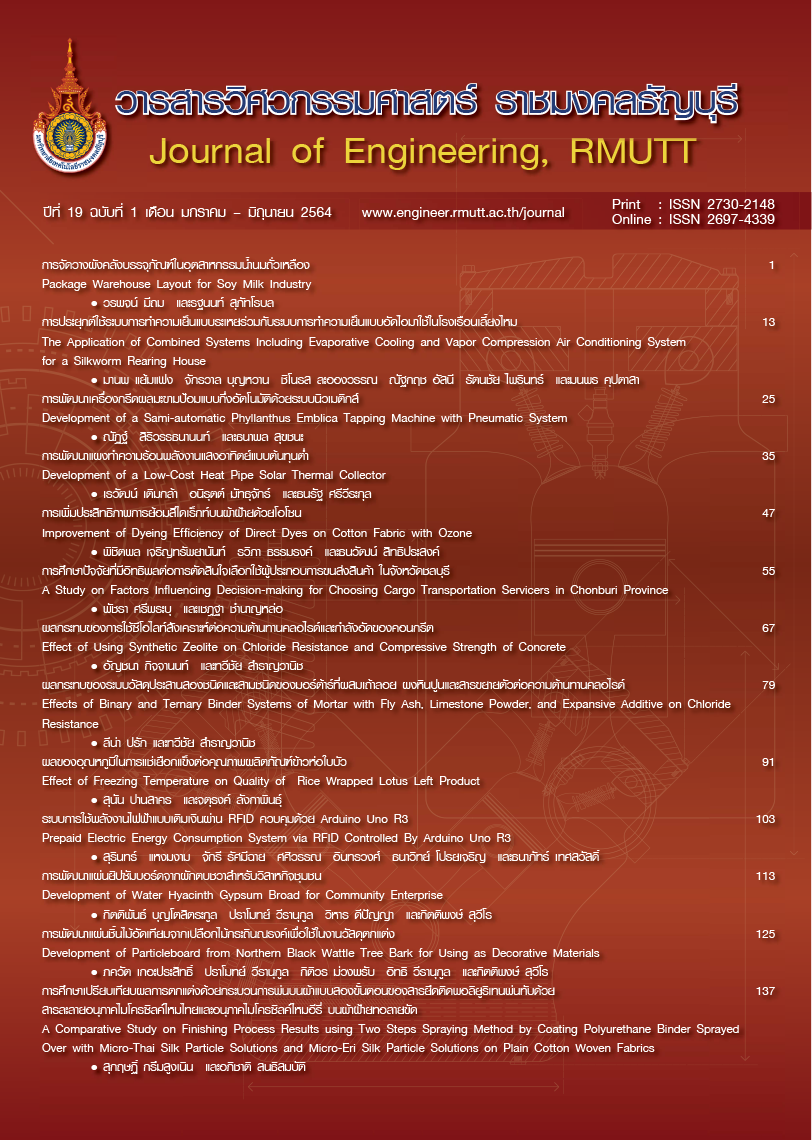Effect of Using Synthetic Zeolite on Chloride Resistance and Compressive Strength of Concrete
Main Article Content
Abstract
This paper aims to study the effect of using synthetic zeolite on chloride resistance and compressive strength of concrete. In this paper, Portland cement type I and synthetic zeolite were used as cementitious materials. The binder content in concrete was replaced by synthetic zeolite at 0.01, 0.03, 0.05 and 0.10 of synthetic zeolite to binder ratios. Water to binder ratios were kept at 0.50 and 0.60. The rapid chloride penetration and compressive strength of concrete were performed at 7, 28, 56 and 91 days of curing time. Chloride penetration by bulk diffusion was tested after 28 days of water curing and immersed in 5.0% chloride concentration for 28 days. The study results showed that concretes with synthetic zeolite had better chloride resistance than cement-only concrete at all water to binder ratios. Concrete with 0.03 of synthetic zeolite to binder ratio had the best chloride resistance. This property is because silica and alumina of synthetic zeolite can react with calcium hydroxide to form CSH and CAH, and the small particles of synthetic zeolite can fill the void in concrete. But, concretes with synthetic zeolite had lower compressive strength than cement-only concrete because cement content was reduced by using synthetic zeolite in concrete, resulting in decreased compressive strength. Moreover, concrete with 0.50 of water to binder ratio had higher chloride resistance and compressive strength than concrete with 0.60 of water to binder ratio.
Article Details
The manuscript, information, content, picture and so forth which were published on Frontiers in engineering innovation research has been a copyright of this journal only. There is not allow anyone or any organize to duplicate all content or some document for unethical publication.
References
Sumranwanich T, Tangtermsirikul S. Concrete structure deterioration. Bangkok: Charansanitwong Printing (in Thai); 2018.
Tangtermsirikul S. Durability and mix design of concrete (1st edition). Pathum Thani: Thammasat University, Rangsit Campus; 2003.
Davis M.E. Zeolite and molecular sieve : not just ordinary catalyst. Ind. Eng. Cham. Res. 1991;30:1675-83.
Najimi M, Sobhani J, Ahmadi B, Shekarch M. An experimental study on durability properties of concrete containing zeolite as a highly reactive natural pozzolan. Construction and Building Materials. 2012;35:1023–33.
Sabet F, Ali N, Shekarchi M. Mechanical and durability properties of self consolidating high performance concrete incorporating natural zeolite, silica fume and fly ash. Construction and Building Materials. 2013; 44:175–84.
Ahmadi B, Shekarchi M. Use of natural zeolite as a supplementary cementitious material. Cement and Concrete Composites. 2010; 32:134–41.
Karakurt C, Topcu I.B. Effect of blended cements with natural zeolite and industrial by-products on rebar corrosion and high temperature resistance of concrete. Construction and Building Materials. 2012; 35:906–11.
Valipour, Pargar M, Shekarchi F, Khani S. Comparing a natural pozzolan, zeolite, to metakaolin and silica fume in terms of their effect on the durability characteristics of concrete. Construction and Building Materials. 2013;41:879–88.
Valipour, Pargar M, Shekarchi F, Khani S, Moradian M. In situ study of chloride ingress in concretes containing natural zeolite, metakaolin and silica fume exposed to various exposure conditions in a hash marine environment. Construction and Building Materials. 2013;46:63–70.
American Society for Testing and Materials (ASTM). ASTM C1202, Standard test method for electrical indication of concrete's ability to. resist chloride ion penetration.
American Society for Testing and Materials (ASTM). ASTM C1556, Standard test method for determining the apparent chloride diffusion coefficient of cementitious mixtures by bulk diffusion.
American Society for Testing and Materials (ASTM). ASTM C1152, Standard test method for acid-soluble chloride in mortar and concrete.
British Standards. BS 1881-116, Method for determination of compressive strength of concrete cubes.
Nas M, Kurbetci S, Nayir S. Investigation on strength and durability properties of concrete containing zeolite. 13th International Congress on Advances in Civil Engineering; 12-14 September 2018, Izmir, Turkey.
Eskandri H, Vaghefi M, Kowsari K. Investigation of mechanical and durability properties of concrete influenced by hybrid nano silica and micro zeolite. Procedia Materials Science. 2015;11:594–9.
Ikotun B.D, Ekolu S. Strength and durability effect of modified zeolite additive on concrete properties. Construction and Building Materials. 2010;24:749–57.
Canpolat F, Yılmaz K, Kose M.M, Sumer M, Yurdusev M.A. Use of zeolite, coal bottom ash and fly ash as replacement materials in cement production. Cement and Concrete Research. 2004;34:731–5.


